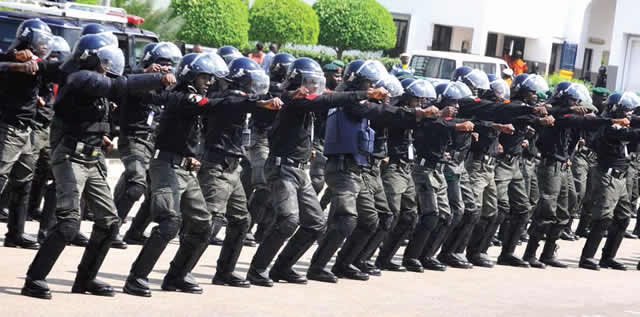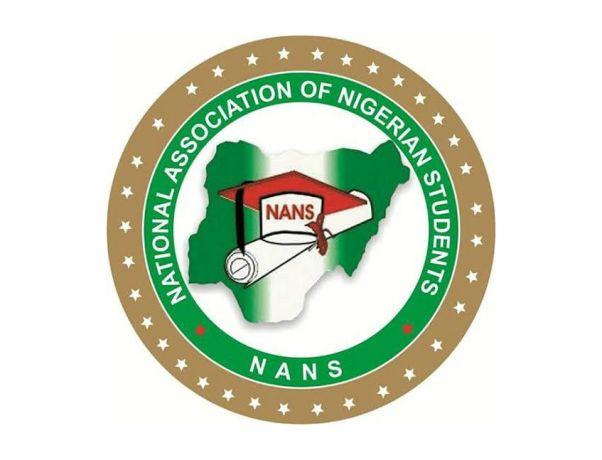President Muhammadu Buhari on Monday gave the Inspector-General of Police, Ministry of Justice and National Human Rights Commission three months to work out the modalities for the implementation of the report of the Presidential Panel on the Reform of the Special Anti-Robbery Squad.
The panel, which was chaired by the Executive Secretary of the NHRC, Mr Tony Ojukwu, had in conjunction with the commission, investigated allegations of human rights violations by SARS.
In the report of the panel submitted to Buhari at the Presidential Villa, Abuja, it recommended among others, the establishment of state/local government police and various reforms to make SARS more citizen-friendly.
Shortly after the panel submitted its report to the President on Monday, some civil and human rights groups called on the National Assembly to take action.
The panel also recommended that SARS should be renamed Anti-Robbery Section and should operate under the Intelligence Unit of the Nigeria Police as it was hitherto.
Panel recommends dismissal of 37 police officers, prosecution of 24 others
The panel recommended the dismissal of 37 police accused of violating the rights of Nigerians from service and the prosecution of 24 others for abuses.
Another recommendation was that the Inspector-General of Police, Mr Mohammed Adamu, should fish out 22 other officers accused of violating the rights of citizens.
It also asked the Nigeria Police to pay compensation to 45 complainants, in addition to tendering public apologies and complying with court orders in 10 separate cases.
President gives three months’ deadline
While receiving the report, the President noted that since the recommendations of the NHRC was actionable in court, he had given a directive for the modalities for the implementation of the report to be worked out within three months.
He stated, “I want to thank the panel once more, and hereby direct that since the recommendations of the commission that constituted the panel are enforceable as decisions of the court, that the Inspector-General of Police and the Solicitor General of the Federation/Permanent Secretary, Federal Ministry of Justice, should meet with the commission to work out the modalities for the implementation of the report within three months from today.”
Buhari, who said he was happy that, finally, a full investigation had been conducted into the alleged abuses by SARS, added that he believed the recommendations would help assuage the pains suffered by the victims and make the police work better.
He added, “I believe that the report of the panel and recommendations contained therein would go a long way in redressing the grievances of the complainants, ensure accountability on the part of the police officers in discharging their responsibilities and facilitate the various police reforms being introduced by this administration.
“I want to assure you and all Nigerians that this administration will continue to fulfil its obligations of promoting and protecting human rights of Nigerians, and will give the National Human Rights Commission all the support required to ensure full implementation of the recommendations contained in its report.
“In addition, we will strengthen the operations of the commission to enhance its effectiveness and capability to resolve cases of human rights violations.
“This administration is conscious of the role the commission plays in ensuring security and stability in the nation through the resolution of complaints of human rights violations, which if neglected, could result into major security challenges.
“As you are aware, I have recently approved the re-constitution of the governing council of the commission. The names of the council members will be submitted to the National Assembly for confirmation before the inauguration of the council in line with NHRC Act, 1995 (as amended).”
Speaking earlier, Ojukwu recalled how the commission acted on Buhari’s directive on August 14, 2018 to set up the panel.
He said the panel began work and received “113 complaints on alleged human rights violations from across the country and 22 memorandums suggesting how to reform and restructure SARS and the Nigeria Police in general.”
He disclosed that the panel held sittings in the six geopolitical zones to give both the complainants and police the opportunity to make presentations.
Ojukwu added, “At the end of its public hearing and having listened to complaints as well as defendants and their counsel, the panel recommended 37 police officers for dismissal from the force.
“Twenty-four were recommended for prosecution. The panel also directed the Inspector-General of Police to unravel the identity of 22 officers involved in the violation of the human rights of innocent citizens.
“The police were directed to pay compensation to various 45 complaints and tender public apologies in five complaints and directed to obey court orders in five matters.
“The police were directed to immediately arrest and prosecute two retired senior officers found to have violated the rights of citizens (one for extrajudicial killing and the other for illegal takeover of property of a suspect). The panel also recovered two vehicles illegally auctioned by SARS and returned them to their owner.”
He added, “Significant improvement in the funding, kitting and facilities of the Nigeria Police Force; strengthening Information and Communication Technology of the force; establishment of state and local government police; and institutionalising a Special Investigation Panel to annually hear and determine complaints on alleged human rights violations against operations of the Nigeria Police Force were also recommended.”
NASS must prepare to act on presidential report on state police – CACOL, SERAP, CDHR
Meanwhile, civil and human rights groups, Centre for Anti-Corruption and Open Leadership, Socio-Economic Rights and Accountability Project, and the Committee for the Defence of Human Rights, said the deadline given to the Inspector-General of Police must be strictly adhered to, especially as it concerned reforms on the Special Anti-Robbery Squad.
CACOL Director, Debo Adeniran, said, “First, it is beyond the President and the IG to carry out full reforms. They can only implement policy statements based on the Police Act. Before they can execute the state and local police which Nigerians are asking for, they need the assent of the National Assembly to implement these actions.
“But in the interim, the IG must operationalise a police structure where certain aspects can be put under the command of the state and local governments. What we need to do on SARS in an overhaul. It is either we end it or the IG renews the operational methodology of the anti-robbery and anti-kidnapping arm of the police.”
Also, the CDHR National President, Malachy Ugwummadu, said, “A decentralised police is not possible without a prior or corresponding amendment of the constitution by the National Assembly. In this regard, I refer to Section 214 of the 1999 Constitution as amended that recognises that there shall be a single Nigerian Police Force. But we have all suffered the weight of this constitutional provision. So, the urgency of a decentralised police force is never in doubt.”
Meanwhile, SERAP Executive Director, Adetokunbo Mumuni, said, “What I see in it is that whatever concerns and affects us as a country must be addressed and treated frontally. We have been having security problems and they seem not to go hastily.
“And that is why I think the directive of the President to the IG to solve the security problems must be taken seriously. What must happen is that the three-month ultimatum given to the IG must be adhered strictly to, for effective results.”
President’s directive not approval of state police – Presidency
Meanwhile, the Presidency in a statement clarified that Buhari’s directive to the aforementioned offices to work the modalities of implementing the report did not imply that he had approved state police.
A statement by the President’s Senior Special Assistant on Media and Publicity, Mr Garba Shehu, said Buhari “requested that the report be studied and a white paper produced within three months.”
It added, “President Buhari’s specific directive is that a three-man panel be set up to produce the white paper.
“The report of the white paper committee will form the basis of the decisions of the government on the many recommendations, including the setting up of state and local government police made by the Ojukwu panel.”

 Boss Picks4 days ago
Boss Picks4 days ago
 Opinion6 days ago
Opinion6 days ago
 Events5 days ago
Events5 days ago
 Opinion4 days ago
Opinion4 days ago
 Adding Value5 days ago
Adding Value5 days ago
 Featured5 days ago
Featured5 days ago
 News5 days ago
News5 days ago
 Headline3 days ago
Headline3 days ago














